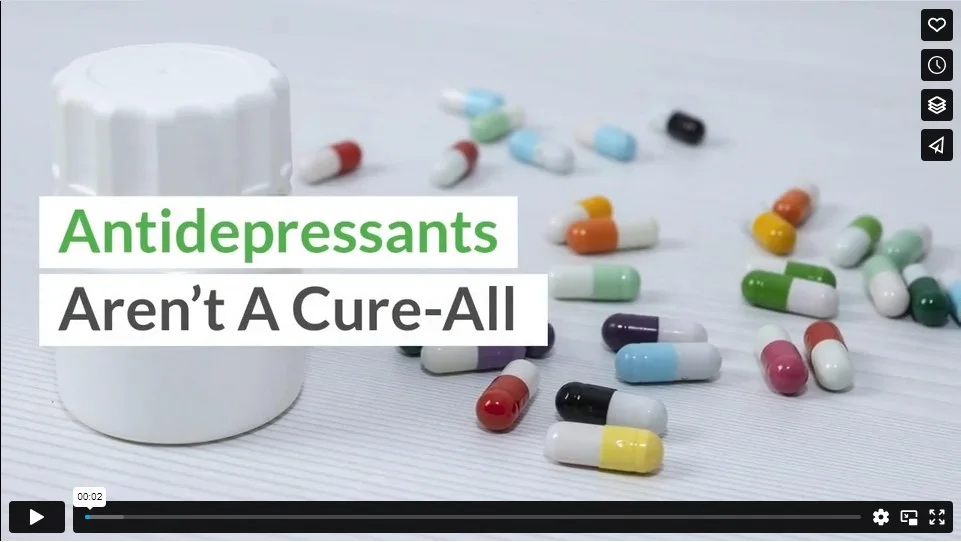Antidepressants work by changing levels of neurotransmitters, chemicals in the brain that affect mood, depression, and anxiety. To experience the full benefits of these medications, you need to take the prescription as directed for approximately six to eight weeks.
Unfortunately, finding the right antidepressant or treatment combination is often a process that can take time. The first medication you try may work great for relieving your depression symptoms, but the side effects could be too difficult to tolerate. Getting relief from your symptoms is possible, but it is essential to know the signs your medication may not be working for you.
1. You Feel Better Immediately
Depression medications can take anywhere from two to 12 weeks to make significant changes in the balance of your neurochemicals. If you feel a difference in your mood immediately after starting a new medication, it is most likely a placebo effect or a side effect of the medication and may not be long-lasting.
2. Your Depression is Lingering After Months
Within three months of starting a new medication, you should see some improvement. If you are taking your medicine as directed and not seeing appropriate results, you should speak to your doctor about other treatment options.
3. You Aren’t Sleeping Well
Antidepressants can make you more sleepy, less tired, or not affect your sleep. They can cause vivid dreams or nightmares and jerking of arms and legs when very tired. If you are experiencing side effects that prevent you from getting adequate sleep, your depression symptoms may not improve like you had hoped.
4. You Have More Energy But Are Sad
This is a dangerous combination that your doctor should know about right away. The depression medication is starting to work, giving you increased energy. However, it isn’t relieving the feelings of sadness, which can lead to an increased risk for suicide. Speak to your physician right away if you encounter these feelings.
5. You Are Experiencing Intolerable Side Effects
Most depression medications work in similar fashions, so it comes down to the side effects you experience. Weight gain and sexual dysfunction are two significant side effects that you may see with one medication and not with another. If the side effects interfere with your ability to enjoy life, talk to your doctor about what you are experiencing.
Common Reasons Your Antidepressant Isn’t Working
There is no one reason why a medication doesn’t alleviate your symptoms. Every person is different and the best solution to relieving symptoms of depression or anxiety varies as well. There may be contributing factors that are standing between you and happier days.
- Developing a Tolerance: If you have been taking the medication for a reasonable amount of time, you may feel a decrease in the effects. Your doctor may need to increase your dose to get the same result. You may also need a higher dose if your dose is too low when starting a new medication.
- Mixing Medications with Alcohol or Drugs: Certain drugs or alcohol can change how your body processes the prescription, altering the effectiveness. Let your prescribing doctor know about any recreational drug use or alcohol consumption.
- Interactions with Other Medications: Some prescription medication, over-the-counter medication, or supplements can cause the same issues as recreational drugs or alcohol. They can affect absorption, breakdown, and elimination of the medication, causing weaker or more potent effects. Be sure your doctor knows about all prescription and over-the-counter medications you use.
- Not Taking the Medication as Prescribed: Your prescribed depression medication may need to be taken at the same time each day, with or without food, or have more specific instructions on the bottle. Skipping doses or not following the administration directions can cause delays in feeling better.
- Increased Stress Levels: You may have a medication that is working well, and then something happens in your life that makes you think your medication may not be working. Grief, illness, trauma, or other stress will make it harder to cope even with the help of effective medicines. Practicing self-care and looking at alternative and conjunctive treatment options may be your best option.
If Your Antidepressant Stops Working
Continue to take your medication as prescribed, even if you feel it’s not working, until you speak to your provider. Abruptly stopping your prescription can be very dangerous. Speak to your provider about adjusting your medication, switching to another antidepressant, or attending group therapy or self-help groups. Connecting with others who are going through similar experiences can positively impact your outlook and depression recovery.
If you are struggling with a substance, like alcohol or recreational drugs, interfering with your medication, you could benefit from a treatment program for substance use disorder. If you can stop using drugs or alcohol, you may find that your medications work differently.
While antidepressants can help you overcome many of your depression symptoms, they may not be the cure-all you would like. If you have tried medications without success, speak to your provider about alternative therapies. Transcranial magnetic stimulation is as effective as medication without all the side effects antidepressants have. TMS for depression uses magnetic pulses to stimulate neurotransmitters in the parts of the brain that influence mood instead of drugs stimulating them. It is non-invasive, and you could see improvement more quickly without being on a potential lifelong medication.
Although the first course of action when you have depression is to take medication to ease the symptoms, not every person responds well to antidepressants. It is crucial to review the signs that antidepressants may not be for you. Speak to a doctor about alternative depression treatments if your medication isn’t working.
Video

